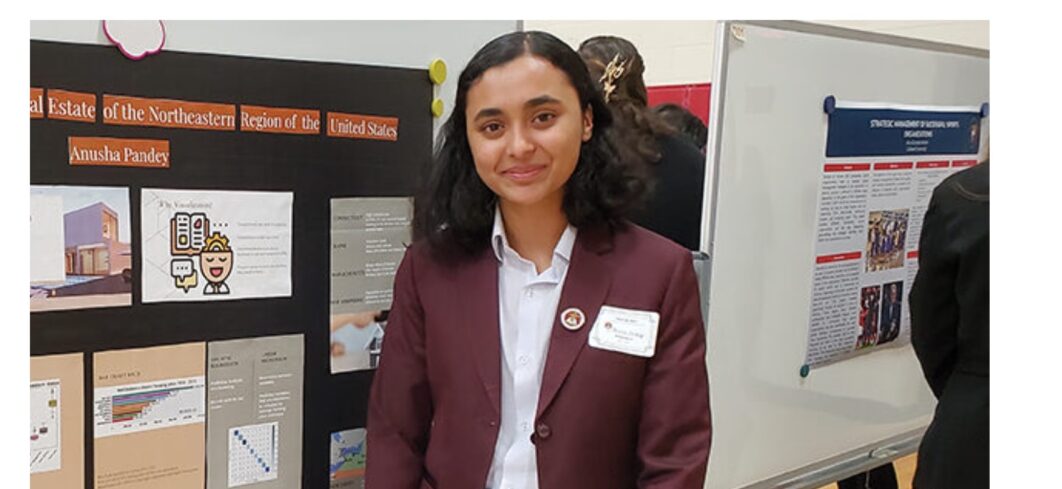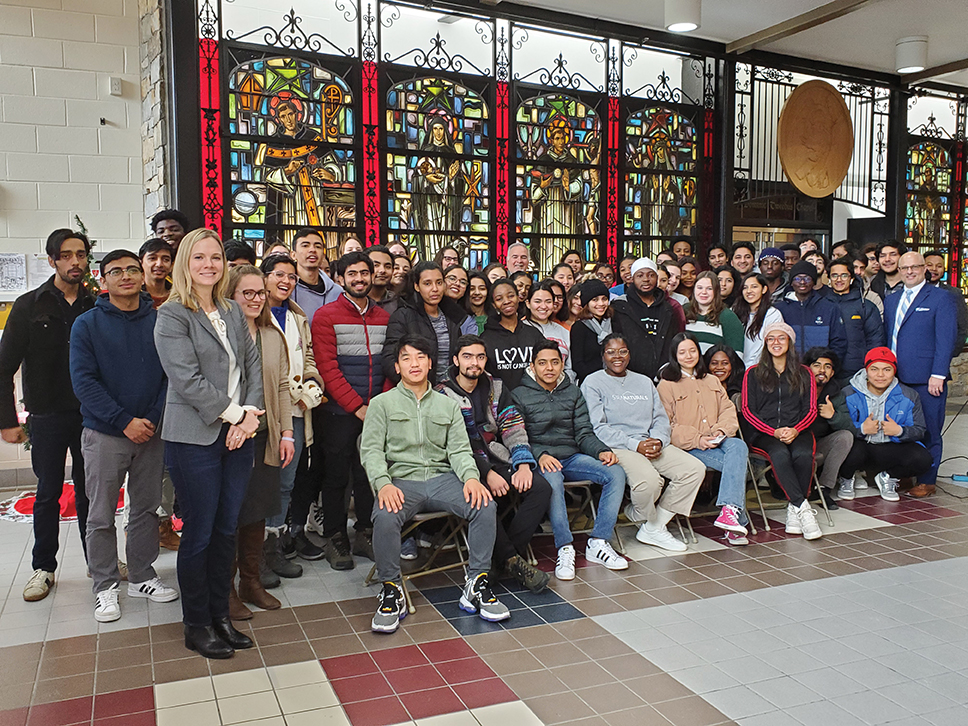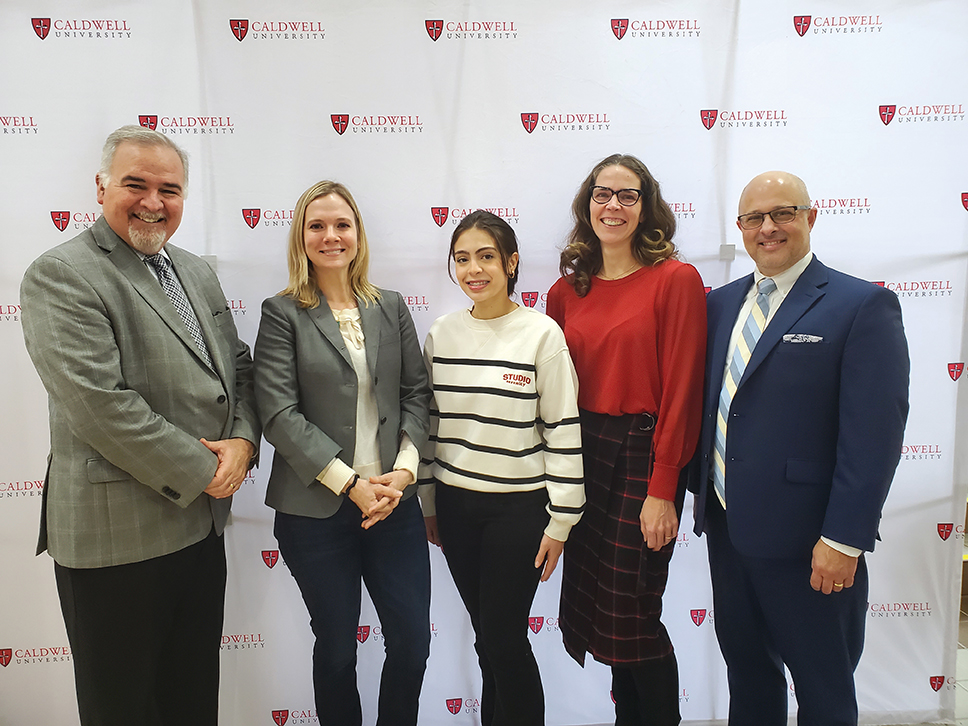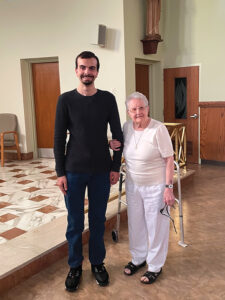Caldwell University
February 16, 2023
The Honors Program: The Making of Scholars and Researchers

Alumnus Aarion Romany ’20 spends much of his time at the University of Maryland School of Pharmacy engaging in research and presenting on that data. As a Ph.D. student in pharmaceutical sciences with a concentration in computational biochemistry/biophysics, he uses advanced molecular dynamics and machine learning techniques and works closely with experimentalists. He has often recalled his Caldwell days when he started developing those research skills while in the honors program. “Working with my advisor to come up with a hypothesis and design ways to test that hypothesis helped prepare me for the journey I’m on right now.” It also helped boost his application when he applied to graduate schools. The honors seminars were beneficial too. “They really helped me hone my critical thinking skills and made the gap between undergraduate and graduate a bit smaller.”
Those are exactly the benefits Professors Tara Harney-Mahajan, Ph.D., and Stephanie Sitnick, Ph.D., want students in Caldwell’s honors program to acquire—to come out of Caldwell prepared for graduate school and life after college. “It is a selective, rigorous place for students to do interdisciplinary work, be challenged and challenge themselves,” explains Harney-Mahajan, an associate professor of English. The program is a collaborative community of thinkers, scholars and researchers that fits alongside the liberal arts foundation of the institution.
The students are held to a high standard, says Sitnick, associate professor in the Psychology and Counseling Department and the Calman Endowed Chair. “And the nice thing is that it really pushes some of them out of their comfort zone and focuses them to really learn new perspectives.”

Senior Ashley Celis felt pushed out of her comfort zone. Entering the program as a freshman, she was a bit intimidated but knew it was important to seize the opportunity presented for a college student. A psychology major with a minor in sociology, she decided to focus her project on “Factors Contributing to Ethnic/Racial Minority College Students’ Willingness to Seek Mental Health Treatment.” With the support of her advisors, she pushed herself through the new experiences of undergoing the Institutional Review Board approval process, conducting a survey and collecting and analyzing data and in a short time learned what she was capable of.
A pinnacle of the honors project is the poster presentation at the annual Research and Creative Arts Day in the late spring when students showcase their work for other students, faculty, staff, alumni and guests in the packed Student Center gym. After Celis got through the initial “nerve-wracking” set-up period, the reception she received wowed her; “it is just easier to talk about something that I’m passionate about.” She was so energized by her topic that she is continuing the research and applying to graduate school for doctoral programs.
“Research, no matter what field you are in, can be a tortuous, wonderful, rewarding journey, and it takes a lot of practice, but it also takes confidence,” says Harney-Mahajan. Learning to deal with failure and to pick oneself up after rejection is a valuable lesson and part of being an academic, explains Sitnick. “Students develop and hone their critical thinking and analytical skills by pushing beyond the boundaries of any one discipline or field.”
Benjamin Fernandez is working on his honors project on “Spirituality in Art.” Among the artists he has chosen to include is Caldwell Professor Emerita Sister Gerardine Mueller, O.P., whose artwork adorns the campus. He interviewed the 101-year-old last fall in the St. Catherine of Siena Convent on campus where she showed him the sacred art she had created including stained glass windows of Dominican saints and the eucharistic tabernacle. One goal of Fernandez’s project is to show that with the University’s rich diversity, people can overcome any illusions of separation “by reaching one another on a common, spiritual level to achieve a transcendent wholeness, and art is one of those areas.”


Faculty create contemporary seminars for the program that align with the times. Courses being offered this semester are “The Holocaust in Film,” co-taught by Dr. Benjamin Lammers of the History and Political Science Department and Professor John Yurko of the Communication and Media Studies Department; “Exploring Diversity: Privilege and Oppression,” taught by Dr. Thomson Ling of the School of Psychology and Counseling, and “Language, Self and Society,” taught by Dr. Yang Cai of the Sociology and Criminal Justice Department. “We are always recruiting faculty, junior faculty, senior faculty,” said Harney-Mahajan. Anusha Pandey, a senior computer science major, enjoyed the interdisciplinary honors seminars she took, which allowed her to learn and to conduct research across disciplines: “Utopian Societies” with English Professor Doug Anderson, Ph.D., and “Music and Arts” with Music Professor Laura Greenwald, D.M., as well as the honors core class “Writing Power” with English Professor Mary Ann Miller, Ph.D. In that class, Pandey learned “how to
write, how to captivate people’s attention,” which has helped her throughout her college career.
The professors are gratified at how the program becomes its own community, especially since community is a University core value and a Dominican pillar. “I had more emails than ever this fall asking ‘Can I apply to the program?’” says Harney-Mahajan. The faculty members host luncheons and dinners to celebrate the students and have a student e-board that plans events ranging from a game night to bringing alumni to campus for networking. Pandey was vice president of the e-board her sophomore year and president her junior year. Most of the events had to be done virtually, but professors made the program work well, bringing on alumni for networking opportunities and advising the students as they created a logo for an honors project pin and a T-shirt. “It’s really fun to see that something we created is now being passed on to others,” Pandey says.
Bibek Dhungel, a senior chemistry major, was last year’s honors mentorship program coordinator, a key student-run initiative that pairs incoming honors freshmen with honors upperclassmen. He explains that since the first year of college is usually hard to navigate for students fresh out of high school, especially if they’re out-of-state or international students, having a mentor has been shown to help freshmen transition to college and into the honors program effectively. “I was a mentee once and really benefited from my mentor, who helped me pick out courses and even gave me some insider tips/tricks to navigate college and the honors program.”
The program is a growth opportunity for the professors too. “You never stop learning, and it is such a great [thing] to do it from these fresh perspectives,” Sitnick says. One of her favorite times on campus each year comes when she walks into the packed gym on an April morning to witness a sea of beautifully displayed projects, with the hard work of faculty and students showcased in one place and colleagues and students engaging together. “It is such a wonderful way to see all of the great work that happens at Caldwell.”
—CL
Top photo: Anusha Pandey presented her honors project “Data Visualization of Real Estate of Northeastern Region of the United States” at the 2022 Research and Creative Arts Day.





